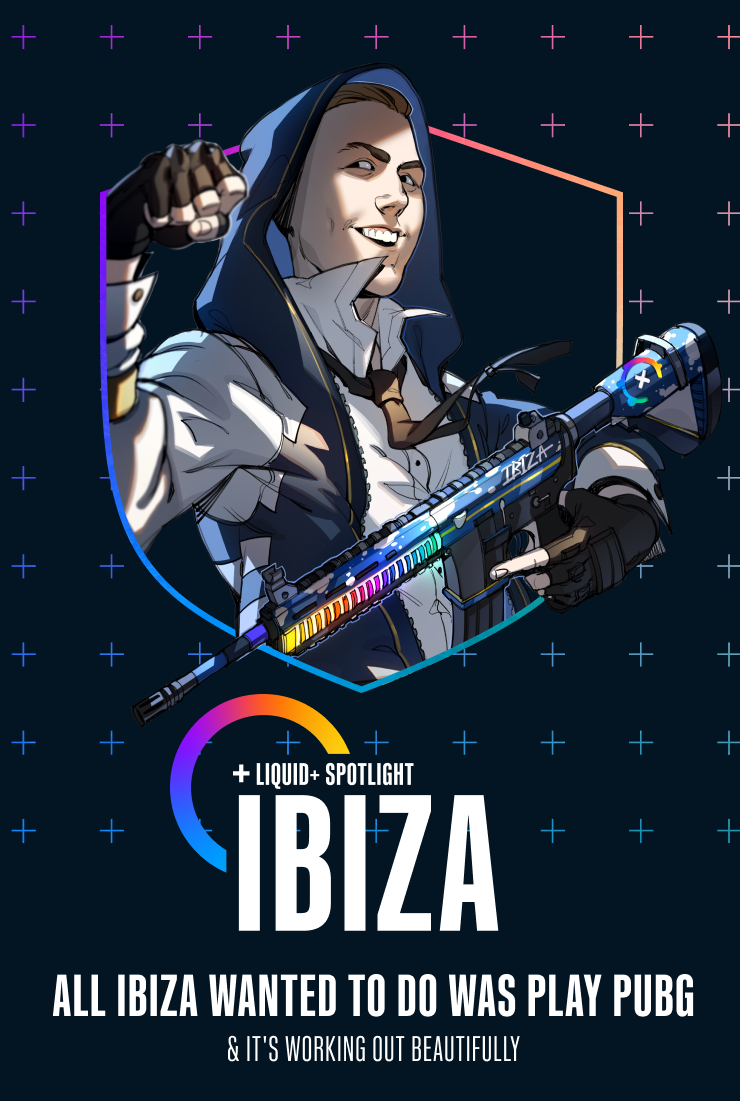All Ibiza wanted to do was play PUBG

All Ibiza wanted to do was play PUBG
Esports is not designed for those worried about long-term life-planning calculations. Professional gaming is notoriously fickle; teams dry up overnight, prize money is chronically volatile, and entire organizational ecosystems can be sundered by a blase shift of interests around a corporate boardroom.
Still, I was surprised when Jord "Ibiza" van Geldere told me he had no aspirations for his future beyond PlayerUnknown's Battlegrounds. He possesses no delusion of grandeur. Ibiza did not put a career on hold to chase this dream. This is not a man that would've been studying for the bar or analyzing cancer cells if he wasn't dropping into Erangel on the weekdays. Instead, he developed a prestigious talent for digital marksmanship at the precise moment in human history when industry powers were prepared to reward that skill. The rest is history.
"I never enjoyed school that much. I'd always rather be playing games. People were like, 'Yeah I wanna do this or that,' but I never had an idea for my future. I just kinda lived day-by-day," says Ibiza. "Then PUBG came out and became an esport."
Ibiza tells me his parents were worried about him. His mother works as a teacher, his father in finance, and the family built a life on the outskirts of Rotterdam. Neither mom nor dad knew what to make of a child who decided to go all in on his PC gaming superiority over every other career path. (It brings to mind that scene in Say Anything, where John Cusack explains his passion for kickboxing to a deeply perturbed John Mahoney. If only he knew the UFC revolution was around the corner!) "They saw my friends doing good at school, and I was spending a lot of time gaming and my grades went downhill," laughs Ibiza. "They were concerned."
This was in the mid-2010s, as Twitch culture writ large was first penetrating into the general social sphere. In 2021, when Ninja is appearing on the Tonight Show and Pokimane is making cameos in Free Guy, it's a lot more feasible to turn headshots into a lucrative, healthy brand. But in 2015, Ibizia was in the wild west.
His first love wasn't PUBG. Instead, surprisingly, Ibiza tells me the initial shooter he obsessed over was a little-known product called The War Z, which was later renamed Infestation: Survivor Stories. The War Z, to put it mildly, does not have the best reputation. In fact, some critics regard it as one of the worst games ever made.
The software arrived to Steam in 2012 as a clear DayZ facsimile. These two games shared a lot of the same DNA—featuring a grim, post-Soviet open world, a swathe of bloodthirsty zombies, and a ton of ArmA-like simulation concerns: your character needs to eat and drink to stay alive, an inventory to be managed, and modular damage that affects each part of the body independently. That's the appeal. At its core, The War Z wasn't a shooter, it was a survival game.
It didn’t matter: The War Z was immediately panned by critics, earning a particularly spectacular 2/10 from Gamespot due to its predatory microtransactions, terrible A.I., and an unrefined multiplayer apparatus. Despite that, The War Z did find an audience. Ibiza is one of the best PUBG players in the world, and he started honing that talent in one of the most inauspicious games ever released.
Like many kids, Ibiza grew up playing consoles, and long before he migrated to tense, anxiety-riddled hardcore shooters, he took turns with Call of Duty, but was worn thin by the format. The constant, pulverizing monotony—spawn in, run around a couple of corridors, take aim at everyone else in the match—didn't meld with his sensibilities. With its loot, attachments, and random firefights, a game like PUBG seemed to offer so much more to chew on. So consider Ibiza an early adopter; a few years after The War Z made landfall, every major game publisher on earth embarked on their own takes on the fledgling Battle Royale genre. How nice to be ahead of the curve.
"[War Z] was more tactical. You have snipers and assault rifles. You had to build your stash," Ibiza says. "That variety was more exciting to me."
In that sense, it was easy to predict Ibiza's sensationational rise to dominance. So many of us came to PlayerUnknown's Battlegrounds like it was a profound, radical experiment. "You're telling me I can drop in anywhere? And that I start each game unarmed?" These tenets seem like second nature in an industry that cranks out new Battle Royales every other week, but in 2017 they were truly alien to the majority.
Except, of course, if you were already logging midnight shifts into DayZ or The War Z, and rummaging around in the muck to arm themselves as a nation of bloodthirsty survivors bear down from every conceivable angle. Ibiza never needed to learn the new language. He was a master of this brand new format from the moment PUBG briefly supplanted League of Legends at the top of the Twitch charts, while the rest of us were still catching up. With those bona fides, an esports career was a natural evolution.
"I streamed a little bit before PUBG came out. It was always for fun, on the side. But when that game blew up on the platform, my channel slowly started to grow, and I saw a PUBG team get picked up by TSM. I was like, 'Damn, I want to do that, too,'" continues Ibiza. "That's when I started seriously thinking about doing this professionally."
Gaming careers are chaotic. Nobody walks into a competitive scene and exits with a Team Liquid contract the same day. Ibiza was no different; he kept his nose to the grindstone, logging a season with the upstart Polish organization Team Kinguin, back when pro-level PUBG was still a twinkle in Brendan Greene's eye. Ibiza played with Kinguin until February of 2018, after he got in contact with former Team Liquid captain Keiron "Scoom" Prescott, who was in the process of reupholstering the roster from the ground up.
"He was just like, 'Do you want to join? I'm looking for three people,'" remembers Ibiza. In 2021, Team Liquid's roster is shockingly stable. Ibiza, Jim "Jeemzz" Eliassen and Jere "Jembty" Kauppinen have each been active in the squad since 2018, with a fresh newcomer signing up last year. The esports industry is famous for its turnover—there are League of Legends journeymen who've logged service time on multiple organizations within the same year. But this team is built with a different philosophy. The Liquid quartet here wins and loses together, with no existential rebuilding threats on the horizon. Stability is underrated.
"We're kinda crazy as a group to be honest," laughs Ibiza, when asked about the indelible shared sense of humor that binds the team together. "We like to joke around a lot. We're not a boring team."
Ibiza says he noticed the difference from the second he started competing under the Team Liquid banner. There are plenty of paper-thin esports companies with a logo and a Discord channel with no true bureaucratic heft underneath. That all changes after signing with one of the powerbrokers, and getting spirited away to the training facilities, personal chefs, and health regimens available at the highest tiers of competition. ("I was like, damn," says Ibiza, as he remembers what it was like to first don the cobalt blue Team Liquid jersey.)
That is how quickly a life can change in esports. Ibiza transcended his gaming PC in the Netherlands and found himself competing for life-altering prize money in a matter of months. So much for not having a plan.
"There's more growth potential. The brand is a lot bigger. You could just feel they were more professional, the whole vibe," he says.
Ibiza notes that he wasn't nervous after suiting up for his first fully professional matches. Embracing the moment came naturally. "I wasn't affected by the pressure. I love the pressure," he continues. "A lot of people sign with an organization and immediately start performing worse. But back then, I could really feel like the pressure was helping me. I was really confident."
To succeed in esports, players need to understand that pure technical skill can only get them so far. This isn't the NBA, where raw physical attributes can carry an athlete like Shaquille O'Neal to multiple titles, nor is it boxing, where George Foreman's left jab solidified him as an all-time knockout artist. Competitors are bound by the hard limits of the PC battlefield; nobody can break the game. So, at the top flight of PlayerUnknown's Battlegrounds, you can expect everyone dropping in to be an expert marksman blessed with razor-sharp reflexes—to work an advantage, one must excel in the margins. That is why I'm not surprised when Ibiza tells me his greatest talent is his communication.
"It's about listening to your teammates. Things get really hectic in PUBG, and that causes people to tunnel vision. I'm always trying to listen," says Ibiza. He's not the main IGL (in-game leader). Shotcalling was never his role. But to win in the pressure cooker, it's important to add in whatever insight was gleaned from the state of the match, without stepping on anyone's toes. That sort of collaborative strategy requires a ton of trust and mutual respect—it's easier said than done.
"I try to give side input. I'm pretty good at that. To give suggestions here and there. It's hard sometimes. The IGL already has a plan in their head. So you need to grab their attention, and very quickly, throw out another idea. 'We can also play from here because that gives us access to this and that,' and hopefully he considers it," says Ibiza. "There's so much happening, there's so much info coming through. You need to be aware of all 360 degrees. You need to be ready to rotate, or be pre-planning situations. A lot goes into this."
This is one of the quirks that makes professional PlayerUnknown's Battlegrounds unique. There isn't a lot of downtime in Counter-Strike, where a round that lasts longer than two minutes is a marathon. The same can be said for Dota 2 or Call of Duty, where a gank is always a split-second away. But Erangel is different. The Team Liquid squad likes to start in the center of the map, where they quickly dominate and clear out any other squads foolish enough to challenge their optimization. And then… they chill and they loot. "We see the circle and we start talking about it as a team," says Ibiza. It's nice to know that even when there's thousands of dollars on the line, PUBG allows its competitors to shoot the breeze and wait for the timer to tick down.
Since early 2020, there's been a new voice in the room. Team Liquid welcomed the 25-year old Dane Nikolaj "clib" Madsen to the battalion, right in the heat of the pandemic. It's always a challenge to develop chemistry and get up to speed in self-isolation, but Ibiza seems to believe the new-look roster is clicking on all cylinders. In fact, Ibiza sees something in clib that he recognizes in himself; that incredible, insatiable hunger of a dedicated athlete who's finally earned a shot in the majors. Clib plays with real fire in his eyes, and that's something that Ibiza wants to recapture.
"That's the downside of being in esports for a while. I've been noticing that I've not been as motivated because I've been in PUBG for so long. I've been streaming for two or three years. I never took time off. I think I've been grinding too much," says Ibiza. "So right now I need to step it up a bit. I'm trying to take more breaks. I booked my first vacation. I'm excited to do that, relax, and come back hard."
Ibiza already has plenty to show for all his grinding. Team Liquid took first place in the PUBG 2018 Polaris Series, they came in second in the Europe Continental Series at the end of 2020, and they've started 2021 off well with a championship victory at PSL Season 9.
Still, I'm sure everyone on the roster wishes they could get over the hump more often, especially after another second place finish at a Continental Series this past June. Battle Royales are like bike races or marathons—with the randomness and sheer number of competitors, finishing in the top five is plenty to be proud of. But there's no doubt that Liquid has the talent and coordination to secure a few more titles. Ibiza would be the first to admit it.
"It was our confidence. We're always first going to our second day of competition, and then we end up throwing it," he says. "You start to play a little bit differently, and things don't go as easily. That's the problem."
Consider it the only irony that dogs Ibiza. Spend any time with the man, and you will quickly conclude that the one quality he doesn't lack is confidence. But perhaps that's also one of the lasting lessons he leaves us about success in esports. Bravado is great, but you know what's even better? Self-awareness. Self-awareness to understand when your strategic input is more trouble than it's worth; self-awareness to diagnose the passion in a fledgling teammate's play; self-awareness to know when you're playing tight after carrying a lead into the twilight of a tournament. Those are the lessons you learn when gaming was the only future you had in mind.
Writer // Luke Winkie
Design // Tiffany "Luzufu" Peng
Art // Nicole "Nips" Echeverria











